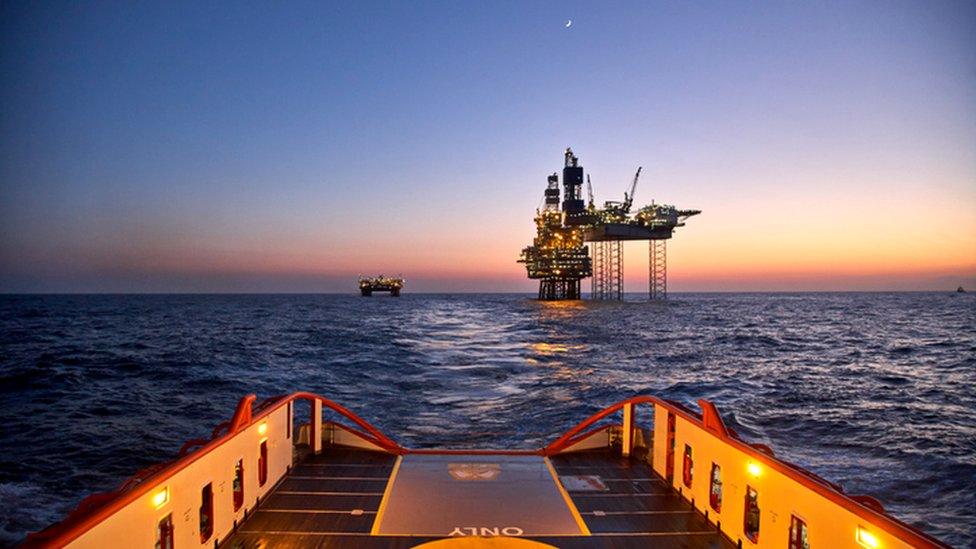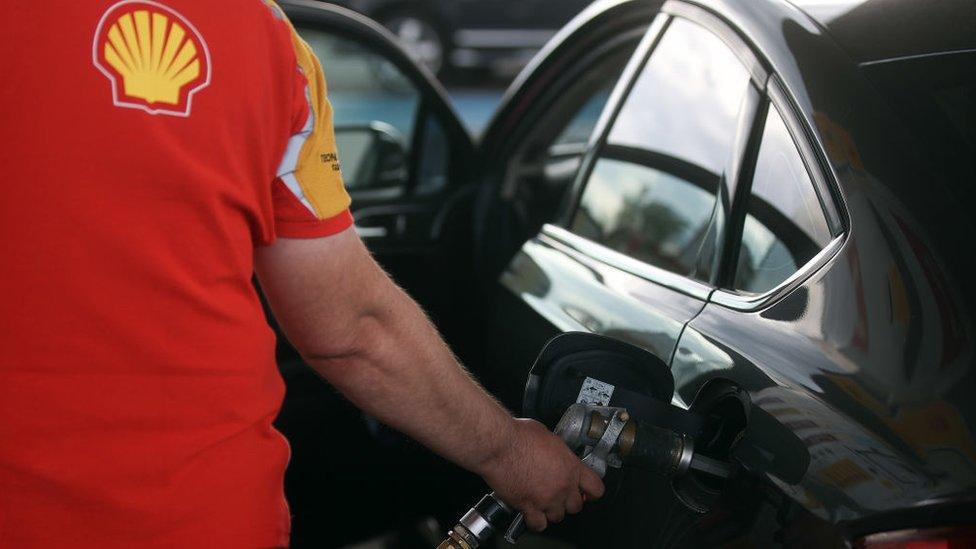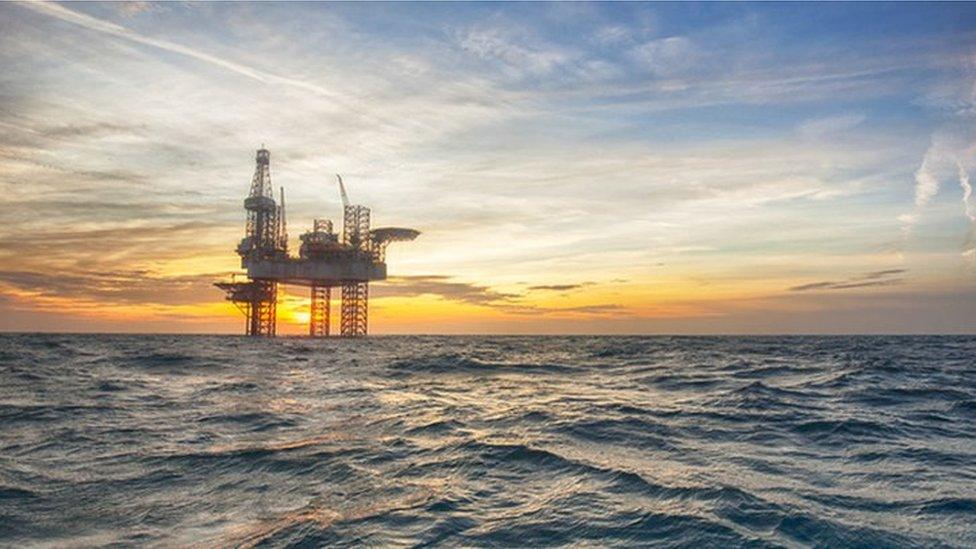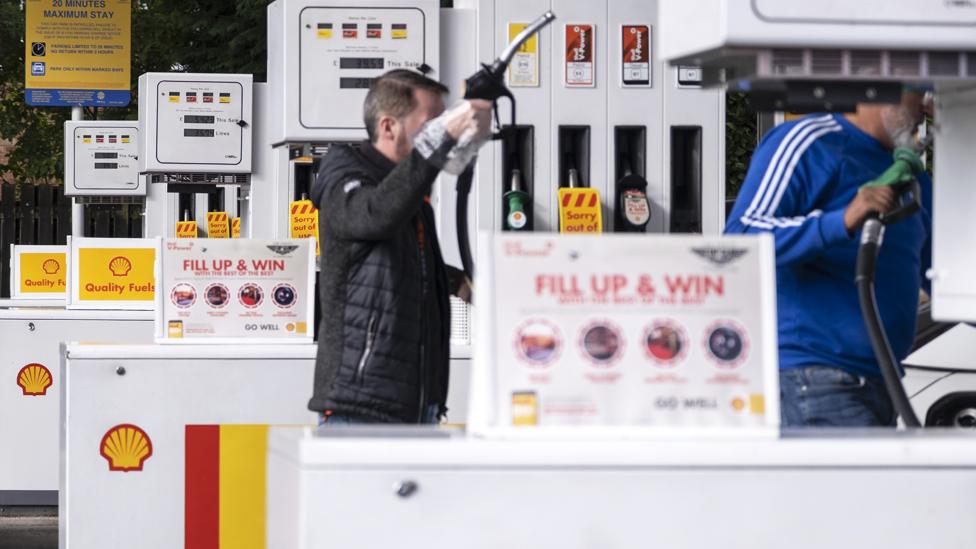What will the energy windfall fuel?
- Published

Huge profits for upstream oil and gas producers are renewing calls for the public to take a larger slice of their earnings. But the shape of those profits does not fall evenly - not so much of it is from UK waters
The latest global outlook for energy shows the Ukraine war has presented an opportunity to accelerate the shift from fossil to renewable power.
Until that capacity is in place, filling the gap is going to rely on more gas and some coal, while grabbing a bigger share of profit can put necessary investment at risk
Bumper profits for Shell fuels demands for a bumper slice of that for His Majesty's Revenue and Customs, to help pay the bills for households and businesses across the UK.
Some $9.2bn in the third quarter of this year, or £8.5bn, is more than double last year's profit for July, August and September. It's down slightly on the second quarter of 2022, with the oil price falling.
And that's a juicy autumnal plum for the windfall tax - sorry, an 'energy profits levy' - to be extended beyond the 25% additional charge on profits applied by Rishi Sunak when he was chancellor in May.
That's in addition to the 40% rate of tax applied to most UK oil and gas production, already well above the 19% rate of corporation tax for most others.
But not all the plum is British. Shell is a British-registered and London-headquartered company. But it pays tax to many different countries where it operates. Only the upstream part that extracts oil and gas in the North Sea and West of Shetland is subject to these extra taxes.
Its forecourts and retail shops are not. And importantly, nor are the bulk of its drilling activity and refining in other parts of the world.
Being a mature 'basin' for oil and gas, the North Sea offers companies like Shell the opportunity to offset tax with investment in new developments or in decommissioning of retiring platforms, wellheads and pipelines. That's why it doesn't pay all that much tax to the HMRC.
Wintry chill
So while Shell gets the headline attention as a home-grown consumer facing brand, we should be mindful of other companies drilling in UK waters.
Total Energies, based in France, has producing assets to the east of Aberdeen, east of Orkney and some big fields west of Shetland. Its third quarter profits are up to $9.9bn, up from $4.7bn for the same period last year, and slightly up on the second quarter.

It would have been more, but by staying active in Russia while other energy firms departed at considerable cost, it now says it doubts that it will be able to repatriate as much as $3bn in profits made in Russia.
CNOOC International is part of the Chinese National Offshore Oil Corporation, with a big stake in Buzzard, currently one of the biggest producing UK North Sea fields. The company does not break down its earnings from around the world, most of them in Asian waters. Its third quarter profit was up 89% to $5.1 billion or, if you prefer, 37 billion yuan.
It may be a sign of the changing nature of international relations that, nine years after spending $15bn on taking over Nexen, the Canadian driller with extensive UK assets, CNOOC is now reported to be trying to sell them and for much less, with Norway's Equinor named as a potential buyer.
It seems that the Chinese state's stake in CNOOC looks vulnerable to western sanctions as relations head for a wintry chill.
Eye-watering
Such companies and others you may not have heard of are the ones facing large chunks of windfall tax already and possibly subject to more; Harbour, Serica, Enquest, Energean, Tullow.
Will that happen? The Labour Party's been arguing for a bigger gouge at profits. As Chancellor, Rishi Sunak was firmly against a windfall tax, until... he was for one, in May.
Liz Truss was against extending it, though took aim at electricity generators' excess profits with a scheme which is yet to be worked out. And with Ms Truss departing Downing Street, it's back to Mr Sunak and his Chancellor, Jeremy Hunt.
They appear to be flexible and open to decisions on budgeting which are 'eye-watering' and potentially 'embarrassing'. We should know more with the chancellor's statement on 17 November.
But one idea being supported by the IPPR left-leaning think tank, and on track to being introduced in the USA, is that the Treasury should take a chunk out of share buy-backs, such as the ones being pursued by Shell.

With excess profits which are not being paid out in dividends or ploughed back into investment, these are widely used to benefit shareholders by concentrating ownership and boosting the share price. Thus, they also help - by no coincidence at all - to fulfil the criteria for paying out big bonuses to senior executives.
Among those using buy backs are banks, which are also eyeing the debate about windfall tax with some caution. Their profits have been rising, because they can make more profits out of higher interest rates.
They already face a levy on top of a corporation tax that is due to rise from 19% to 25% of profits. The levy is due to fall from 8% to 3%, effectively increasing the bank tax from 27% to 28%, but Jeremy Hunt could choose to increase that further.
Four trillion dollars
Meanwhile, from the International Energy Agency (IEA) comes a warning that there's a lot more to be done if we're to get anywhere close to the target for reducing use of fossil fuels.
It puts a positive spin on the rift this year between Russia and customers to its west, saying it should serve to accelerate the shift away from dependence on cheapish fossil fuels towards renewable energy.
But basing one scenario on governments and companies doing what they say they should and will, gas burning will peak later this decade, and oil won't peak until the mid-2030s.
The role of fossil fuels within the energy mix is on schedule, under that scenario, to fall from 80% to 60% of world demand by 2050. Emissions will fall from a peak of 37 billion tonnes of carbon dioxide in 2025 to 32 billion tonnes.
That means investment in renewables more than doubling to $2,000bn per year by the end of this decade.
And yet that still means a 2.5 degree Celsius increase in average temperatures, with severe effects likely for weather, living conditions and agriculture.
To keep to the target 1.5 degree maximum change, the IEA says that the renewables investment has to quadruple, to $4,000bn each year by the end of this decade.
The plain in Spain
The case for investing is much more compelling if the cost of oil and gas remains high.
Rystad energy consultancy has run the numbers on European gas prices remaining quite high for years to come. Assuming they settle around two-thirds of the price they averaged during last year, and a tenth of the peak they reached in August, these experts reckon gas in Europe becomes three times more expensive per unit of electricity than newly-installed solar power.
It is on that sort of calculation, rather than bill-payers or government subsidies, that the big funds can be unlocked. It also requires government support.
In England, that is compromised by a government that is not supportive of onshore wind and has taken against solar panels on farmland.
In Scotland, wind has blossomed onshore and is now embarking on a huge offshore expansion, while the preferred site for commercial solar arrays is as far north as the Moray Firth coast.
Rystad looks very positively on the future prospects for Iberia. It's not just the rain that mainly falls on the plain in Spain, but with Portugal, there is plentiful wind, solar and potentially wave power too.
Without having been dependent on Russian gas, it has been able to keep down energy prices better than others this year, and is well-placed to be the gas pipeline conduit taking North African gas into the European market.
Firing up coal
Another consultancy, Wood Mackenzie, is not so positive about the near-term in Europe and the UK, where energy markets are intertwined.
The case for building new renewable capacity is strong, it says in an analysts' note out on Thursday. But until then, output from France's nuclear power stations is sharply down due to safety checks and repais, and that will continue into 2023, while low rainfall this year has hit hydro generation.
A drop in demand has helped, where EU governments have committed to reducing demand by 15%. The UK has not tackled energy demand, and price has had mixed effects if Scottish Power's latest figures are any guide - gas usage among its 4.8m customers down 22% in the third quarter, but electricity usage down less than 2%.
To fill the gap where demand for power is not being met by renewables, coal burning has been fired up, mainly in Germany and Italy, with a relatively small element in Britain.
Wood Mackenzie points out that the electricity market has seen prices rocket in recent months because gas has been the source of energy that is used at the margin, and it is at the margin that the price is set - that is, the cost of generating the last unit of power.
With renewable power costs being loaded heavily into the investment phase, after which turbines are cheap to run, the consultants say that governments should be looking to reforming the market.
Meantime, the drive to help consumers through very high prices, including a big cut of windfall profits for the energy sector, have to avoid a hit to the business investment confidence required to secure the great energy transition.
Related topics
- Published27 October 2022

